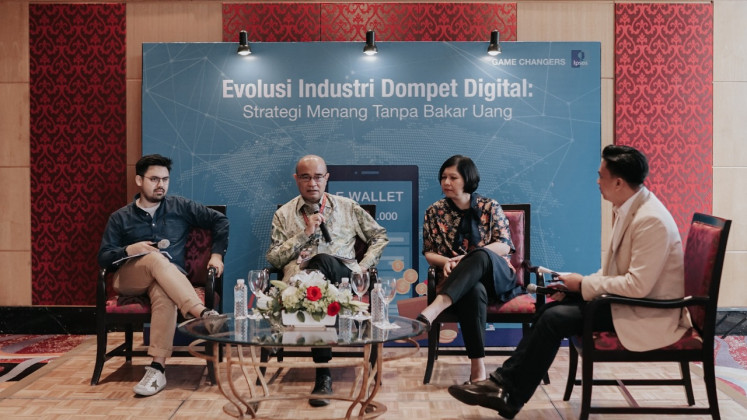
The surge in digital payments as a mainstream mode of transaction in Indonesia and consumer demand for convenient cashless transactions have reached such a level that heavy promotions and marketing might no longer be necessary to attract consumers.
This claim is well supported by available statistics: about 68 percent of Indonesian consumers cite convenience as their primary driver for using digital wallets. Only 23 percent say that they use digital wallets after being influenced by providers’ promotional activities.
The fact that a bigger chunk of Indonesians have by now already absorbed cashless transactions into their lifestyle actually poses a challenge for the country’s top digital wallet players, as the changing consumer behavior will actually require them to shift from promotional campaigns or gimmicks involving cashbacks and subsidies, among others, to tactics that create organic growth. This means developing not only great but also amazing products that can earn consumer loyalty.
Currently GoPay – the digital payment service provided by home-grown superapp Gojek – has the highest market share among the four top digital wallet companies in Indonesia listed in the latest survey by global market research firm Ipsos.
In addition, Ipsos Indonesia customer experience research director Olivia Samosir states that GoPay has the highest market share among organic e-payment users, with 54 percent of respondents saying they will continue to use GoPay even without promotional programs, for various purposes such as to pay transportation fares, as well as food purchases and deliveries.
A further analysis of the research reveals that GoPay is winning among customers because it is more focused on organic growth, implementing strategies that seek to satisfy consumers’ main demand, namely convenience.
“Of the remaining [respondents surveyed], 29 percent will continue to use Ovo, 11 percent will continue to use Dana and 6 percent will use LinkAja, without promos. This survey is unique because it is the first time we have asked young consumers about their willingness to keep using digital wallets without promos,” Olivia says.
According to Olivia, the quality of digital wallet services influences consumer loyalty when using digital wallets rather than promotional campaigns.
“For example, GoPay has the highest number of organic consumers because the consumers already regard its safety, practicality, innovation and customer service more highly and it can be accepted everywhere,” Olivia explained.
Answering the challenge of increasingly tight competition among Indonesia’s digital wallet service providers, Olivia says other players can take a page from GoPay’s playbook: “Players in the industry have to be proactive in shaping consumer behavior by prioritizing used cases, innovation and product quality.”
Commenting on the survey results, GoPay managing director Budi Gandasoebrata says that GoPay’s growth strategy has never been centered around promotions as promotions alone do not create consumer loyalty and long-term demand.
“Our focus has always been on creating quality digital wallet services and building a more comprehensive payments ecosystem that will improve the daily lives of consumers, one transaction at a time,” Budi says, revealing GoPay’s strategy to build loyalty.
Budi says he is upbeat that this strategy will help GoPay attain long-term growth and increase user loyalty, in the face of the coming of age of the e-wallet industry, when users already see digital wallets as the best possible payment method for them.
Looking forward, for digital wallets to achieve and sustain organic growth, they must fulfill consumers’ demands for increased seamlessness, such as allowing digital wallets to directly transfer to bank accounts and to be connected to savings accounts, according to Olivia.
In order to respond to this ongoing trend, Budi says, GoPay will continue to take a strategic approach by expanding used cases for consumers.
“This measured strategy is one of our key strengths in building a sustainable business that is appreciated by everyone, including our investors,” Budi explains.
Meanwhile, Indonesia Stock Exchange business development advisor Poltak Hotradero says it is time for e-wallet players to shift from a “growth at all cost” mindset – usually embodied in various promotional programs – to sustainable growth if they want to continue to be there for their consumers.
Furthermore, promotional programs by digital payment channels have by now earned a bad reputation among consumers as consumers perceive that these promos are causing them to burn cash or burn their wallets.
“Growing at all costs is surely an expensive strategy and provides only a distorted view of actual consumer usage,” Poltak says.
“With the huge potential of micro transactions in the financial sector and the convenience that customers experience, Indonesians will continue to use e-wallets without the industry players having to burn their money. The most important thing now is for all players to enhance safety and convenience for their users,” he adds.